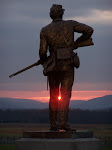Lincoln's "New Birth of Freedom" still resonates
 Glen Cahill and Laura Wills from Red Bank, N.J., brave the cold winter air to view Cemetery Hill, where Union forces repelled a Confederate assault during the Battle of Gettysburg.
Glen Cahill and Laura Wills from Red Bank, N.J., brave the cold winter air to view Cemetery Hill, where Union forces repelled a Confederate assault during the Battle of Gettysburg.Gettysburg, Pa. - Everyone comes here in search of their own private Gettysburg, where armies fought, where Lincoln spoke, where the Union was preserved.
It's winter now, on the once-blood-soaked fields and rocky ridge lines of America's sacred place.
The crowds are thinned, the wind is chilled and a light snow falls on graves and monuments, muffling sounds, dusting history.
You scamper up Little Round Top and look across a "valley of death," where the Union and Confederacy collided over three treacherous and violent days in July 1863.
You drive past memorials cut in stone, remembrances of long-ago military units, soldiers who rallied to causes that tore the country apart.
You scan goods in a gift shop, Robert E. Lee throw rugs and Gettysburg pillows, books and DVDs, key chains, shot glasses, T-shirts, snow globes and golf balls, all adorned with symbols and words that evoke a battle.
But inevitably, you find your way to the National Cemetery, to graves arrayed in a semicircle and to a spot, 50 paces or so from the soaring Soldier's National Monument.
This is where Abraham Lincoln ventured on Nov. 19, 1863, stood on a temporary wooden speaker's platform and gave his Gettysburg Address in front of thousands of people, in a town that knew war all too intimately.
He spoke for two minutes. The words have survived generations, right to the present day and "a new birth of freedom."
Lincoln's phrase remains gloriously alive, the theme for the inaugural of Barack Obama, the nation's 44th president.
"'A new birth of freedom' has probably been quoted more nowthan in any single time in history," said John A. Latschar, superintendent of Gettysburg National Military Park.
There is a line in American history that goes from Gettysburg in 1863 to Washington in 2009, to a turning-point battle in America's struggle to end slavery and to the inauguration of the country's first black president.
"Without Gettysburg, the outcome of the Civil War could have been different," Latschar said. "How it ended, how long it lasted. Everything is tied together."
The Gettysburg Address is a poem and a plea, a 272-word summation of America.
Latschar said he is convinced that Lincoln drafted the speech in Washington and revised it in Gettysburg while staying at the home of David Wills, a local attorney who oversaw the creation of the cemetery.
Latschar said Lincoln laid down a challenge to his country.
"He was talking about the equality of all people," Latschar said. "It continues to resonate ever since. When women went for the vote, they cited the new birth of freedom. Franklin D. Roosevelt talked of his four freedoms."
You walk through Gettysburg and you find others on a journey. Some are chaperoned by tour guides immersed in the history of the battle. Others leap from their cars, rush to the ridge lines, snap photos and move on.
Many linger, contemplate three days that echo still.
Glen Cahill, a red-faced 54-year-old trucking company manager from Red Bank, N.J., tours Gettysburg for the 20th time. The battlefield is 10 square miles of history that changes at every turn.
Up on Cemetery Hill, he stands against the wind and talks of a war he never witnessed.
"As horrible as the war was, it shows the extremes of human emotion - bravery, fear, compassion, the struggle for both sides and how far they were willing to go for their cause," he said.
To Cahill, the war still resonates, "shows the strength of the nation, the resolve we have and our ability to be a great nation in the face of adversity."
Bryan Lee and Jenny Holder, a pair of 18-year-olds from Raleigh, N.C., walk through the cemetery, past small marble blocks inscribed with numbers for hundreds of unknown Union dead.
"It's hard to imagine a whole army marching across a field," Lee said.
The teenagers walk on. The country will soon be theirs.
"It's nice to know that change is happening," Holder said. "But we have history, and it's nice to know America is planted in history."








No comments:
Post a Comment